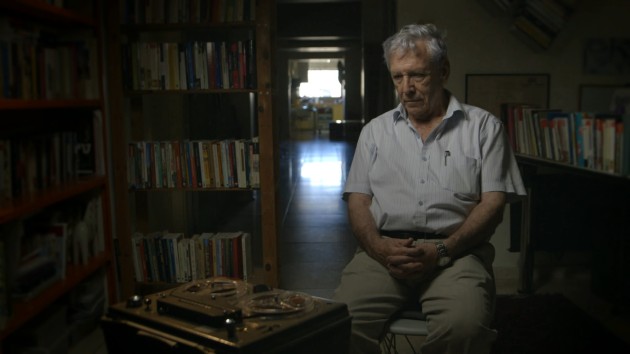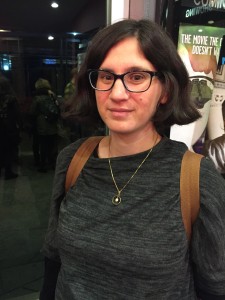
by Amy Stone
“Censored Voices”: Intimate Conversations with Six-Day War Soldiers in a New Film

Amos Oz in “Censored Voices”
Perhaps it was her persona—a young woman utterly pure, idealistic and determined—that convinced Avraham Shapira to entrust Mor Loushy with the 200 hours of soldiers’ interviews from the Six-Day War, tapes that had remained in his closet for nearly 50 years. The tapes, sealed by the Israeli Army, hold the voices of kibbutzniks recorded immediately after the ’67 war, expressing their sadness and pain at what they felt was an uncomfortable turning point for Israel. Their voices undermine the mythic triumphalism of the Six-Day War.
Shapira and Amos Oz—the young kibbutznik who grew into the eloquent novelist— tapped into the raw anguish soldiers fresh from victory could not speak about to wives, lovers, friends. Within months, Shapira had transcribed the tapes into The Seventh Day: Soldiers Talk about the Six-Day War. The Israeli Army censored 70 percent, but even the highly redacted publication created a sensation. But gradually the reaction faded. Pride in the David vs. Goliath heroics triumphed as an essential part of the Israeli mythos.
Over the decades, Shapira was approached by those who would make the tapes public, but, in the words of Loushy, now 33, “he continued to protect the intimate conversations.”
In her 20s at the time, with only one film to her credit as director, Loushy pursued the keeper of the tapes. “I wouldn’t take no for an answer,” she said in a Skype interview from Tel Aviv. When she finally approached Shapira at a university lecture, he was ready to trust her, and invited her to his kibbutz. He handed over the tapes, giving her total freedom to create her documentary. It took her three years.
“Censored Voices” is a very personal documentary—both for the men whose voices are finally heard and for the filmmaker who connects across the generations. Her hands break open the censored seal and set the tape in motion, her voice questions the men who spoke so honestly after the war.
Loushy combines archival footage with the taped voices of the kibbutzniks speaking in discomfort, shame and foreboding after Israel’s stunning victory over the combined forces of Egypt, Jordan and Syria. Much of the footage, from ABC, NBC and other news sources, has never before been seen. Mostly black and white footage, much of the film is shocking in the images of a conquering army. The kibbutzniks speak of shooting Egyptian soldiers wandering in the desert after the ceasefire. In the West Bank, men, women, children, and sheep stream out of their conquered town to the voice-over of one kibbutznik telling of a commander ordering his troops to kill the civilian men. His own commander tells him, “When you chop wood, chips fly.”
The archival footage is combined with shots of the kibbutzniks, now white-haired, seated by the reel-to-reel tape recorder, listening to their own voices for the first time since 1967. They listen intently, nodding in acknowledgment.
The result is “Censored Voices,” invited to premiere at the 2015 Sundance Film Festival and slapped with censorship once again by the Israeli Army. New medium. Old fears. Loushy refused to bow to the irony of a censored “Censored Voices.” The film eventually screened uncut. She will only say that it took a very good lawyer and that she’s not allowed to speak about it. What could happen? She replied, “I don’t know. At the end of the day, the film wasn’t censored.”
The uncensored film went on to win the 2015 Ophir Award—Israel’s Oscar—for best documentary, enjoying a five-month run in Israeli movie theaters, almost unheard of for a documentary. It’s screened worldwide and, in November, “Censored Voices” opened the 9th Annual Other Israel Film Festival sponsored by JCC Manhattan. It has gone on to commercial distribution in New York and Los Angeles.

Mor Loushy, director of “Censored Voices,” the opening film of JCC Manhattan’s Other Israel Film Festival. Photo by Amy Stone.
So how did one young woman succeed in gaining access to the sealed tapes where prominent journalists had failed for decades? Loushy says a couple of elements came together. “Avraham Shapira understood that we are in a crucial time in Israel. The situation is getting worse and worse every year. Our government is not looking for peace. I told him, ‘These voices are not only our past but our present and future.’ He knew that if he was not going to transfer the tapes to anyone, these voices would be buried.”
As to whether Shapira responded to her as a pure and idealistic woman, Loushy says, “That’s a question for him.” She sees the film as an anti-war film, going beyond left-right divisions. She says, “I’m a feminist of course. I think that’s the way I see the world. Part of the feminism is to look for righteousness in the Israel conflict.”
Loushy and her partner, film editor Daniel Sivan, are expecting a second child in January. Pointing to her stomach, she says, “I have to have hope. Without peace we won’t survive.”
She’s currently at work on a film on the secret negotiations behind the Oslo Accords in the 1990s, when Israel and the PLO almost had peace.
For “Censored Voices” trailer go to https://www.youtube.com/watch?v=Eh0Z1VfYPcE.
Check out future screenings at http://www.musicboxfilms.com/censored-voices-movies-126.php?display=presspage.